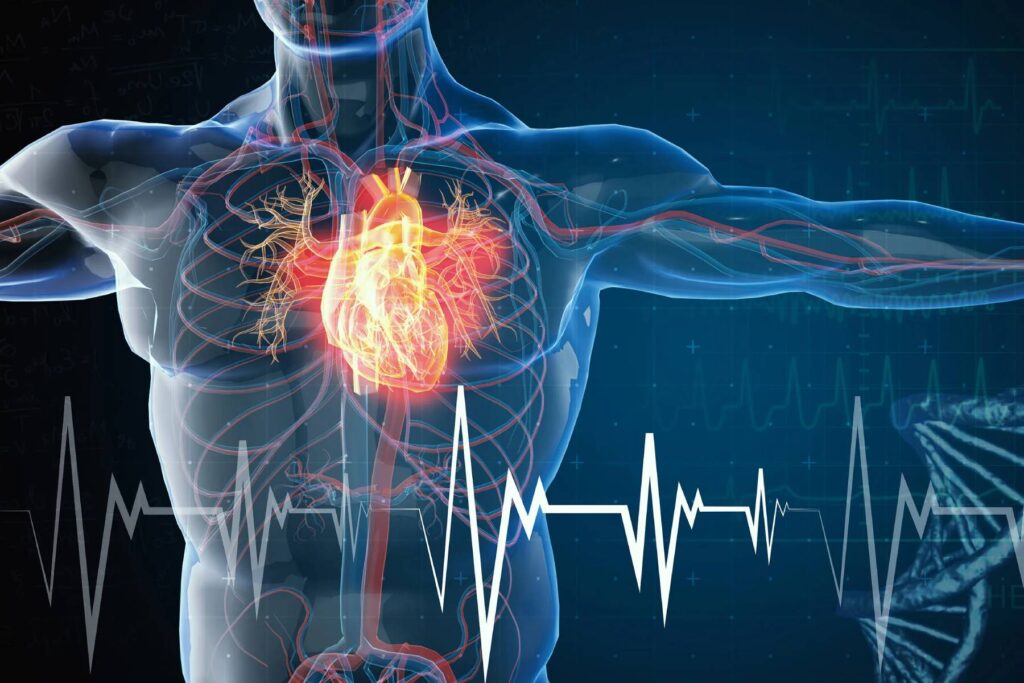We all experience stress, whether it’s from work, family, or daily life challenges. But did you know that stress isn’t just something that makes you feel overwhelmed? It can also have a serious impact on your heart. In today’s fast-paced world, stress has become a silent risk factor for heart problems, and many of us may not even realize how much it’s affecting our health.
In this blog, we’ll explore how stress can contribute to heart issues and, more importantly, what you can do to protect your heart. If you’ve ever felt like stress is taking a toll on your health, keep reading!
Contents
- 1 The Link Between Stress and Heart Health
- 2 How Chronic Stress Can Lead to Cardiovascular Diseases
- 3 What Does a Stressed Heart Feel Like?
- 4 The Impact of Job-Related Stress on Heart Health
- 5 Tips To Manage Stress (That Will Help Prevent Heart Issues)
- 6 Get Connected With an Online Heart Specialist Today
The Link Between Stress and Heart Health
 Stress is more than just a mental or emotional challenge—it has real, physical effects on your body, especially on your heart. Here’s how stress impacts your cardiovascular health:
Stress is more than just a mental or emotional challenge—it has real, physical effects on your body, especially on your heart. Here’s how stress impacts your cardiovascular health:
How the Body Reacts to Stress?
When you’re stressed, your body enters a “fight or flight” mode, preparing you to respond quickly to danger. During this time, your brain releases stress hormones like adrenaline and cortisol. These hormones trigger a series of physical responses such as an increased heart rate, elevated blood pressure, and increased blood sugar levels
Its Immediate Effects on the Heart
Short-term stress (also called acute stress) is a natural response to sudden events like a job interview, traffic, or an argument. While this type of stress typically subsides once the stressful situation is over, it temporarily raises heart rate and blood pressure, which can cause discomfort, palpitations, or even chest pain. For most people, these effects are temporary and don’t cause lasting harm. However, if you have existing heart issues, acute stress can trigger complications.
Stress isn’t just about mental strain—it physically affects your heart by raising blood pressure, heart rate, and increasing inflammation in the body. Understanding the connection between stress and heart health is the first step in taking action to protect your heart.
How Chronic Stress Can Lead to Cardiovascular Diseases

Chronic stress isn’t just an uncomfortable feeling—it can have lasting consequences for your heart. When stress becomes a constant part of life, it doesn’t just affect your mood; it puts continuous pressure on your cardiovascular system. Here’s how:
Increased Blood Pressure
Chronic stress causes your body to continuously release stress hormones like cortisol and adrenaline, which constrict blood vessels and increase heart rate. Over time, this leads to high blood pressure (hypertension), a major risk factor for heart disease. Persistent high blood pressure can damage the walls of blood vessels, leading to a buildup of plaque, which narrows the arteries and reduces blood flow to the heart.
Inflammation in the Body
Stress triggers an inflammatory response in the body, which can damage blood vessels and organs, including the heart. Chronic inflammation is linked to the development of atherosclerosis—a condition where plaque builds up in the arteries, narrowing and hardening them. This reduces the flow of oxygen-rich blood to the heart, increasing the risk of heart attack and stroke.
Increased Risk of Blood Clots
The body’s stress response increases blood clotting factors, which can increase the likelihood of blood clots forming. If a clot forms in the heart or brain, it can block blood flow, leading to a heart attack or stroke. Stress-related increases in blood clotting are particularly dangerous for people with existing heart disease.
Unhealthy Coping Mechanisms
Chronic stress often leads to poor lifestyle choices that further harm heart health. People under constant stress may turn to unhealthy coping mechanisms, such as:
- Smoking: Nicotine and other chemicals in cigarettes damage blood vessels and raise blood pressure.
- Overeating or Poor Diet: Stress can lead to emotional eating, often resulting in weight gain and a diet high in fats, sugars, and processed foods.
- Lack of Exercise: Stress may cause fatigue or a lack of motivation, leading to reduced physical activity, which is crucial for heart health.
Impact on Heart Rhythm
Long-term stress can also affect the heart’s rhythm, increasing the likelihood of arrhythmias (irregular heartbeats). Stress hormones can trigger the heart to beat too fast, too slow, or irregularly, potentially leading to complications, especially in those with existing heart conditions.
Impaired Immune Function
Chronic stress weakens the immune system, making the body more vulnerable to infections and diseases. This can put additional strain on the heart, as the body has to work harder to fight off illnesses. Furthermore, the chronic activation of the stress response can cause long-term damage to the heart and blood vessels.
Chronic stress has a serious, long-term impact on your heart health. Over time, the persistent physical effects of stress—like high blood pressure, inflammation, and unhealthy habits—can significantly increase your risk of heart disease. Managing stress through healthier coping mechanisms, regular exercise, and professional support is essential to protect your heart in the long run.
What Does a Stressed Heart Feel Like?
 Here are common signs that stress might be affecting your heart:
Here are common signs that stress might be affecting your heart:
- Chest pain or discomfort
- Shortness of breath
- Elevated heart rate (racing heart)
- Irregular heartbeats (palpitations)
- Fatigue or tiredness
- Difficulty sleeping
- Dizziness or lightheadedness
The Impact of Job-Related Stress on Heart Health
We’ve all been there—tight deadlines, constant emails, and never-ending meetings. While a little stress at work is normal, job-related stress can start taking a serious toll on your heart health if it goes unchecked. Long hours, pressure to perform, and the constant juggling of responsibilities can put your heart at risk, even if you don’t feel it immediately.
Here’s how work stress affects your heart:
- Increased Blood Pressure: Constant work pressure can lead to elevated blood pressure, which is a major risk factor for heart disease.
- Poor Lifestyle Choices: Stress at work often leads to unhealthy habits like grabbing fast food, skipping workouts, or even smoking to cope. These habits can add up, contributing to heart problems in the long run.
- Lack of Sleep: Stress can make it harder to sleep, and poor sleep affects heart health by increasing inflammation and blood pressure.
- Mental Strain: The constant mental load of work stress can lead to chronic anxiety, which increases the production of stress hormones like cortisol. These hormones can damage blood vessels and increase your risk of heart disease.
If you’re finding work stress overwhelming, it’s time to take a step back and manage the pressure.
Tips To Manage Stress (That Will Help Prevent Heart Issues)
 Managing stress is crucial for both your mental well-being and heart health. Here are some simple and effective tips to keep stress in check and protect your heart:
Managing stress is crucial for both your mental well-being and heart health. Here are some simple and effective tips to keep stress in check and protect your heart:
- Take Regular Breaks
Step away from your work or daily stressors. Even a few minutes of deep breathing or a short walk can help lower your stress levels and give your heart a break. - Exercise Regularly
Physical activity is one of the best ways to reduce stress. Aim for at least 30 minutes of moderate exercise, like walking, cycling, or swimming, most days of the week. - Practice Mindfulness or Meditation
Spend a few minutes each day practicing mindfulness or deep breathing exercises. This helps calm your mind, reduces stress, and lowers blood pressure. - Get Enough Sleep
Prioritize quality sleep. Aim for 7-8 hours of restful sleep each night to help your body and heart recover from daily stress. - Stay Connected
Talk to friends, family, or coworkers. Having a strong support system can help you manage stress better and give your heart emotional relief. - Eat a Heart-Healthy Diet
A balanced diet rich in fruits, vegetables, whole grains, and lean proteins can help reduce stress and support heart health. - Limit Caffeine and Alcohol
While caffeine and alcohol might seem like quick stress relievers, they can actually increase stress levels in the long run. Try reducing your intake to keep your stress in check. - Learn to Say No
Don’t take on too much. Setting boundaries and saying no when needed can reduce work stress and prevent burnout. - Seek Professional Help If Needed
If stress becomes overwhelming, don’t hesitate to seek professional help. Talking to a counselor or therapist can provide valuable coping strategies and support.
By incorporating these simple tips into your daily life, you’ll not only manage stress better but also significantly reduce your risk of heart problems. Remember, small steps can make a big difference for your heart health!
Get Connected With an Online Heart Specialist Today
Taking care of your heart health is more important than ever, especially when stress plays such a big role in your overall well-being. If you’re feeling overwhelmed or experiencing heart-related symptoms, don’t wait to seek help. MantraDoc offers access to online heart specialists who can provide expert advice, support, and treatment options, all from the comfort of your home.
Whether you’re dealing with stress, high blood pressure, or other heart concerns, connecting with a heart specialist today can make a significant difference in your health journey.
Book a Consultation now and take the first step toward a healthier heart and a stress-free future!

